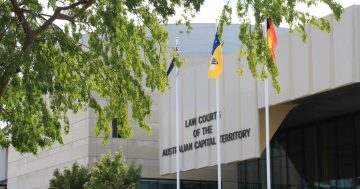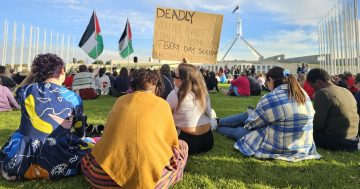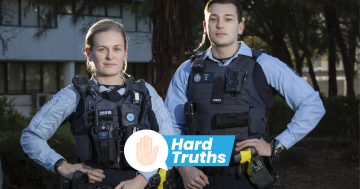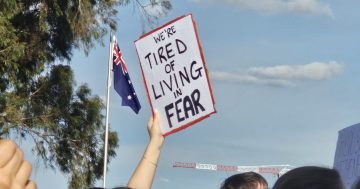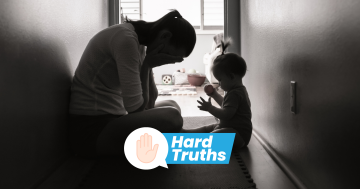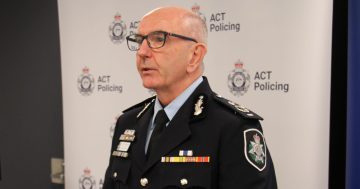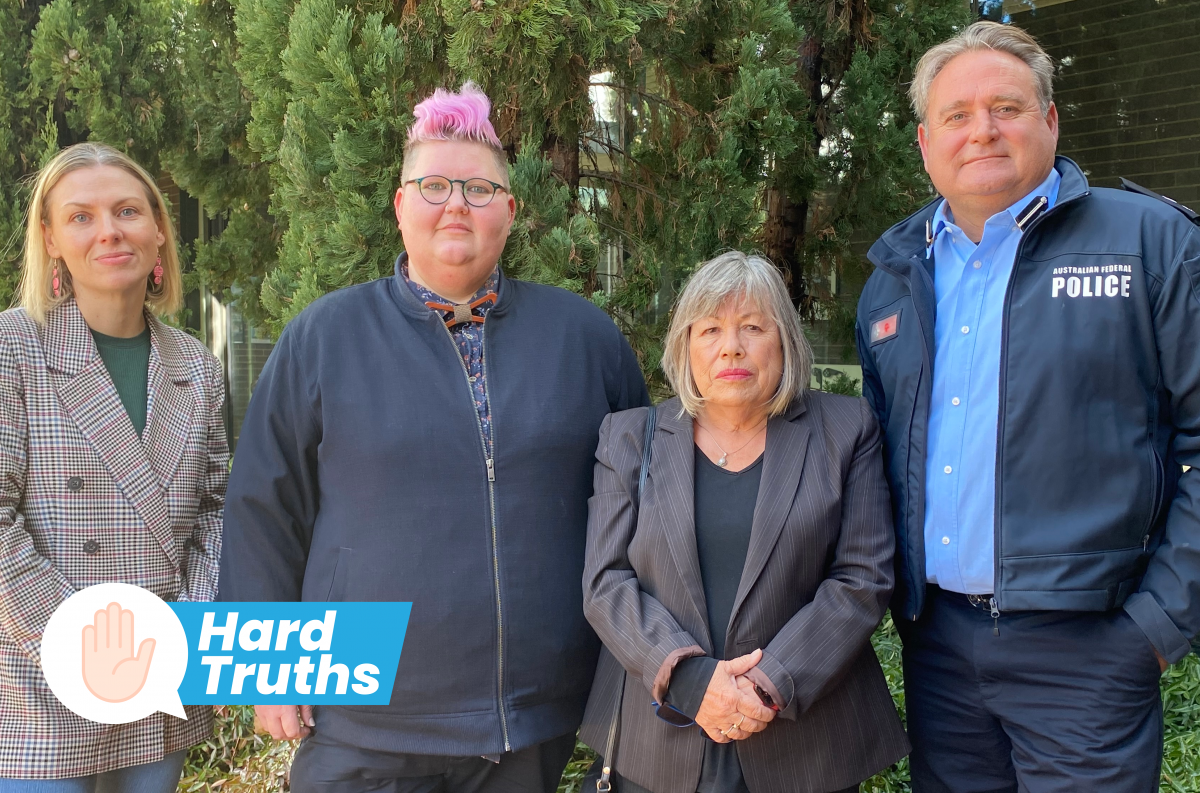
DVCS program support manager Sarah Gillett, DVCS CEO Sue Webeck, Victim Support ACT senior direction Margie Rowe and ACT Policing Family Violence and Vulnerable Persons Act Supt Dave Williams are working collaboratively through FVSAP. Photo: Claire Fenwicke.
It’s an issue that permeates every suburb and social class of Canberra, and one that continues to grow.
Police were called out to 353 domestic and family violence incidents in the past 30 days, 75 of which resulted in arrests.
“It’s not just Belconnen, it’s not Tuggeranong only, it’s not Gungahlin, it is spread across [Canberra],” ACT Policing Family Violence and Vulnerable Persons Acting Superintendent Dave Williams said.
One Territory service provider, the Domestic Violence Crisis Service (DVCS), worked with 1120 individuals in May 2023 alone.
“The rates of access to our service are unlike anything we’ve seen before, and that’s even comparative to last month,” CEO Sue Webeck said.
“It’s not a socioeconomic issue, it’s not employed versus unemployed, this side of town versus that side of town, it is something that a lot of people are impacted by because somebody chooses to use violence.”
Even before the COVID-19 pandemic forced our policing and community services to work more in isolation, there were concerns about agencies working independently rather than sharing information.
While a person’s situation may seem not as risky based on the information an individual agency has, once everyone started pooling the details together the ‘risk picture’ became much clearer.
“That made it clear that the response to cases was being impeded by a lack of coordination and collaboration in the sector, and particularly a lack of information sharing,” Victim Support ACT senior director Margie Rowe said.
Ms Webeck said DVCS had been responding to the victim-survivor, yet they had very little information about the offender.
As a result, the Family Violence Safety Action Pilot (FVSAP) was developed in 2020, sitting within Victim Support ACT. Its aim is to identify and assist people who are outside of the judicial process in a proactive way to reduce the risk of harm.
What began with two staff now has 11, plus two more people seconded from DVCS.
Funded by the ACT Government until 30 June 2025, its current partners are ACT Policing, Child Youth and Protection Services, Housing ACT, ACT Corrective Services, DVCS, Everyman Australia, Toora Inc, Legal Aid ACT and Victim Support ACT.
The ACT Family Violence Act 2016 definition of family violence includes not just physical acts of violence (such as assaults or damaging property), but emotional and psychological abuse as well.
While emotional and psychological abuse, such as coercive control, are not currently criminalised in the ACT, they can form the basis for a Family Violence Order (FVO) and for stalking charges.
Ms Rowe said it was important to get involved much earlier with proactive and preventive action, as factors such as coercive control have been proven to be present in a vast majority of family violence homicides.
“That set of behaviours that you can loosely call ‘coercive controlling behaviours’ is a very high-risk red flag that doesn’t necessarily attract a criminal justice response,” she said.
This is where FVSAP can step in, designed to manage and monitor ‘high-risk cases’ where lethality or serious injury are identified as extremely likely.
Any of the partner agencies, and other organisations and charities as well, can identify a member of a family unit who might be experiencing any aspect of domestic violence and refer them to FVSAP.
“There are people in the high-risk category who aren’t getting family violence orders, they aren’t sitting in front of police in any way, but there is potentially the thought that they are going to separate or the circumstances of coercive control are escalating,” Ms Webeck said.
As of December 2022, there had been 339 formal referrals to the program since it began, involving 579 children.
Risk in family violence situations is not static, and so FVSAP keeps an oversight on both victim-survivors and perpetrators. The partner agencies have a coordination meeting once a fortnight to discuss the higher-risk cases.
DVCS program support manager Sarah Gillett said if risk factors were identified when speaking with victim-survivors, they would speak with them about whether they would like to be referred to FVSAP.
“It’s not necessary to get consent to refer into the program, and there are times when we might be very concerned about a situation where we may decide to refer anyway, but we typically have that conversation with the client,” she said.
ACT Policing Family Violence Unit acting sergeant Caleb Boxx said not needing consent was particularly important for at-risk children.
“They’re the ones who completely lack a voice,” he said.
“The option of referring people to FVSAP when there’s no consent by the parties involved I think is really quite useful.”
The additional focus on the offender allows them to be engaged with services before it reaches a point where charges need to be laid or courts become involved.
There are two perpetrator response advisers involved with FVSAP, who have coordinated responses in relation to 151 perpetrators.
Collaboration with agencies also means services can let police know if they have come across the perpetrator in their previous relationships, which can establish a pattern of behaviour and a clearer picture of the risk of this person.
Measuring the rate of success of the program isn’t as black and white as looking at the number of arrests or police call-outs, as every family dynamic is different.
Act Supt Williams felt it was about everyone’s right to feel safe in their own home.
“If we can just make someone feel comfortable and safe in their own environment, that’s a success,” he said.
“If people feel the need to ring us 15, 20 times a year seeking assistance, we’re more than happy to respond … but if there have been no changes in behaviour, that’s the opportunity for us to look and ask if our responses and programs are adequate to deal with that.”
Ms Webeck said she knew it was successful because they were helping victim-survivors.
“If they’re able to feel safe because of the impact of safety planning, and a plan for when violence escalates – what will they do, where will they go, how will they get there – then that’s success,” she said.
“We can’t measure success in a ‘perpetrator doesn’t use violence again’ way, because they may not use violence again for 10 years … so it really is about supporting those people experiencing family violence in order to reach their goals, whatever they may be, noting it’s not always ‘to leave’.”
The success of the program can also be seen in feedback from participants.
“I love that FVSAP can coordinate a response with other services so the risk and my needs are shared. It helps that all I have to do is talk to one person, because there is a greater risk of my husband finding out when I have to make contact with multiple services,” one participant said.
“The thing I really like about this program is that it creates that visibility of [the offender] … he knows every step I’m making but I know nothing about what he’s doing. This program actually makes me feel like that is changing,” said another.
Despite the size of the issue, anyone experiencing any form of domestic or family violence is encouraged to get in touch, no matter how small you may think the abuse may be.
“It’s a privilege that people in our community trust police enough to call, trust DVCS enough to call, trust any number of services to reach out and say ‘something not ok is happening and I need some help’,” Ms Webeck said.
If you are experiencing domestic or family violence, DVCS has a 24-hour crisis response line, which can be reached on 6280 0900.
If you are in danger or if it is an emergency, call Triple Zero on 000.














